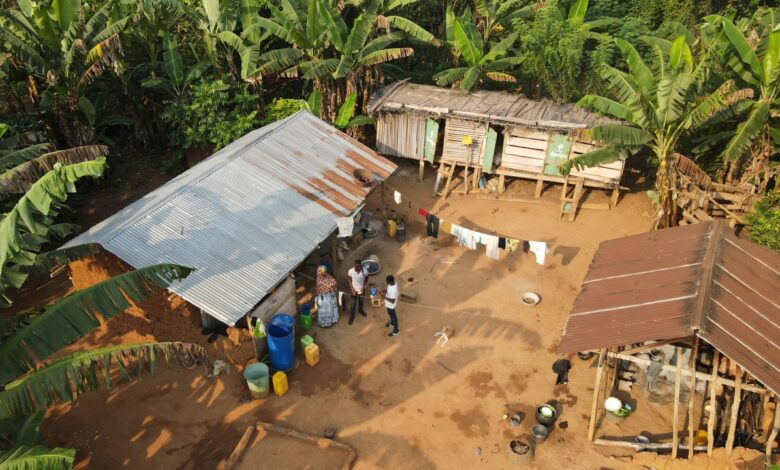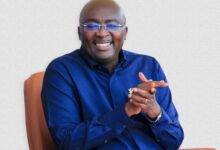
They used to say, in my part of Ghana, that “Nkran abrabↄ
deἑ, economics nkoaa!” (life in Accra is entirely controlled by economics!)
Now, I think, the opposite has become true – life in rural Ghana has evolved to base itself on economics!
In other words, one cannot just get up and say one is going to visit one’s home-town or “village.”
Thanks to the provision of electricity almost everywhere, our rural and city economic have merged!
Take what happened when I went to a funeral at Nsutem, a mere 80 miles or so from Accra. When I opened the car-door to get out, my ears were greeted with music from a loudspeaker that must have been outputting at a rate of 500 watts or something! The drink I was served was ice-cold.
As I enjoyed amenities formerly limited to city or town life, I also noted silently in my head that the expenses at the funeral would similarly be hiked.
Fortunately, I didn’t have too much time to dwell on such mundane aspects of life. For the people were so full of warmth that I reproached myself for thinking as a creature controlled by economics.
“I was named after your mother!” said one woman, as she embraced me, ignoring my facial mask.
“What? You look so much like my late uncle, Kwasi Pong!” I said to a man.
“I am his first-born!” the man replied. What? My uncle Kwasi Pong had a son like that and I’d never met him? Well, how could I have met him when I was spending years and years outside Ghana?
A woman came and held my hands. She just smiled and smiled. And I soon caught on: “You look very much like my Grandmother Amma Gyaa!” I ventured.
She smiled some more and said, “Yes, I am her grand-daughter!”
Oh my God! It was getting ridiculous. But they weren’t done yet. A guy came and pumped and pumped my hand.
“I am Kwasi B…!” he said.
I asked, “Not Kwasi Carpenter?”
“Yes”, he replied.
I was slain. I had been asking of him and no-one had ever told me anything concrete about him. So I had stopped asking. For if you asked too often, you might be told that he or she had “passed”.
But Kwasi B…. was alive! That knowledge alone made my journey worth-while. We had a reunion that was made in Paradise. What? I hadn’t expected to set eyes on him ever again. And neither had he expected to set eyes on me. Now here we were, pressing each other’s flesh.
Life never stands still, does it? The son of another uncle was a preacher. He took the opportunity to tell the people at the funeral that judgement awaited them. I was a bit taken aback, seeing that the people were already full of sorrow and could have done with a bit of comforting. Instead, he was using the opportunity to frighten them. In the hope that they would flock to his establishment to seek salvation from God’s judgement? We,, it was his profession, wasn’t it?
Actually, he did preach a coherent sermon, though I thought it was a bit on the long side.
What impressed me was the professional manner in which the lying-in-state of my uncle had been done. The cloth at the side of the bed was very nice, as was the casket in which he was placed on his way home. The casket had gleaming handles and the wood was very well polished. Good on you, uncle, I thought.
He was the first person in my extended family to score a century of years – he died at the age of 102! Yet he’d never looked as if he was destined reach such an auspicious age. But I should have known, for he was the type of person of whom it is often said, “Ne ho twa!” [he looks fit.]
He was one of three brothers. Wofa Kwasi Pong was the eldest. He was short and a bit stout. Next in line was Wofa Kwadwo Adade. He was my favourite uncle. He loved me to bits. It was largely on his account that I used to spend my school holidays at Nsutem, not Asiakwa. He passed when I was abroad and it hurt me badly not to have been able to attend his funeral.
Behind him came Wofa Kwadwo Kuma (known at Nsutem as “Oti” for a reason I am yet to discover. It wasn’t the three brothers alone who composed my roots at Nsutem. They had a cousin whom I called Wofa Kofi Manu. I remember this latter guy principally because one day, he arrived at Asiakwa, and he was – rather uncharacteristically — preaching!
He’d never been to school, and yet he was preaching! He had one verse upon which he based his sermon, and I was forced to look it up in the Bible to find out whether it was true. I remember the verse to this day – Matthew Chapter 16 Verse 26. It said: “For what will it profit a man, if he gains the whole world, and loses his own soul?” I’ve never forgotten it. He would be very pleased, I think, to learn that I still remember it, though I heard it from his lips only once!
On the way back to Accra after the funeral rites, I learnt a bit more about the Ghana economy. We got some very nice “nsibire” mushrooms to buy – Osiem, Professor Adu Boahen’s home-town, was one of the places where these mushrooms were being sold. Past Koforidua, we saw apem (plantains) and loads of vegetable and fruits.
The merchandise obliges drivers who want to buy some of the stuff to stop on a rather narrow stretch of road. What would it cost the Highways Authority to find out where such stuff is sold on the roadside, and to provide a widened section of road there to enable drivers to stop without constituting a hazard to road-users?
Why are our service providers so insensitive to the real needs of the people they are employed to serve? The myopia and indifference are quite stunning: you are building a road for people to use, and you don’t know that if space should be provided in the food-growing areas to enable food-sellers to operate from? No wonder some unusually enterprising people tried to sell fufu and soup in the environs of the recently-opened Pokuase interchange!
Nature abhors a vacuum, not so?
BY CAMERON DUODU




